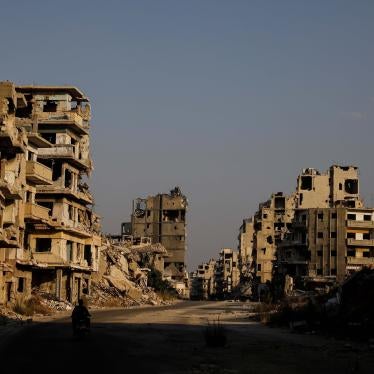Some good news at last in the bleakness of the Syrian conflict. The Egyptian Foreign Ministry on December 10 announced the release of 171 of the 206 Syrian refugees whom officials had detained for months in police stations across Egypt. The authorities released several more in the following days.
Human Rights Watch issued a report on their plight in November. Of the many horror stories about refugees’ attempts to escape and reach Europe by sea, most vivid for me is that of a Syrian mother who had to choose which two of her four children she could rescue as their boat sank. She was trying to leave Egypt, thinking her hardship as a refugee would end if she reached Europe. She could only keep hold of two children while swimming toward a lifeboat. She will probably have nightmares for the rest of her life.
Egyptian officials had detained some 1,500 people, including at least 250 children as young as a baby of one month, on suspicion of attempting to use smugglers’ boats to migrate to Europe. Although prosecutors ordered their release, the national security bureau of the Ministry of Interior instructed police to detain refugees indefinitely until they left Egypt at their own expense. Officials coerced more than 1,300 to leave, and some returned to the dangers of Syria.
Over the course of the Syrian conflict, Egypt has taken in some 300,000 refugees. Many have reported feeling “at home” in Egypt, unlike refugees in Jordan and Lebanon, who note discrimination, even hostility.
Yet the military-backed government, in power since the ouster of former President Mohamed Morsy in July, has imposed arbitrary restrictions on Syrians and Palestinians, including on renewing their residency permits and registering their children in public schools. In addition, a few journalists have accused Syrian refugees of supporting Morsy.
The Egyptian government agreed to free the Syrian refugees from detention after intense negotiations among Egyptian officials and the United Nations, Egyptian and international civil society organizations, and a number of foreign governments sympathetic to the refugees.
Egypt should build on last week’s announcement and release the remaining 30 or so refugees. Egyptian officials should devise a comprehensive, long-term solution for refugees from Syria, particularly for the roughly 5,000 Palestinians among them, including clarifying their legal status, facilitating their access to assistance and to the protections stipulated by international law. Other countries should consider resettling Syrian refugees, and donors should support Egypt in shouldering our collective responsibility for caring for Syrians in need.
No woman fleeing violence in Syria should have to board a death boat out of despair, then choose which of her children she will help keep alive.








